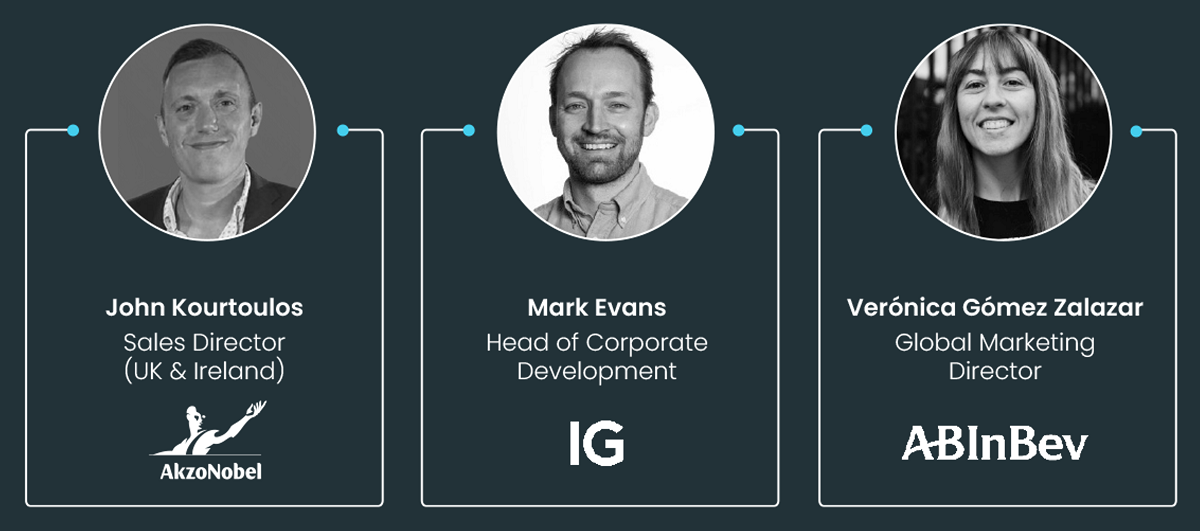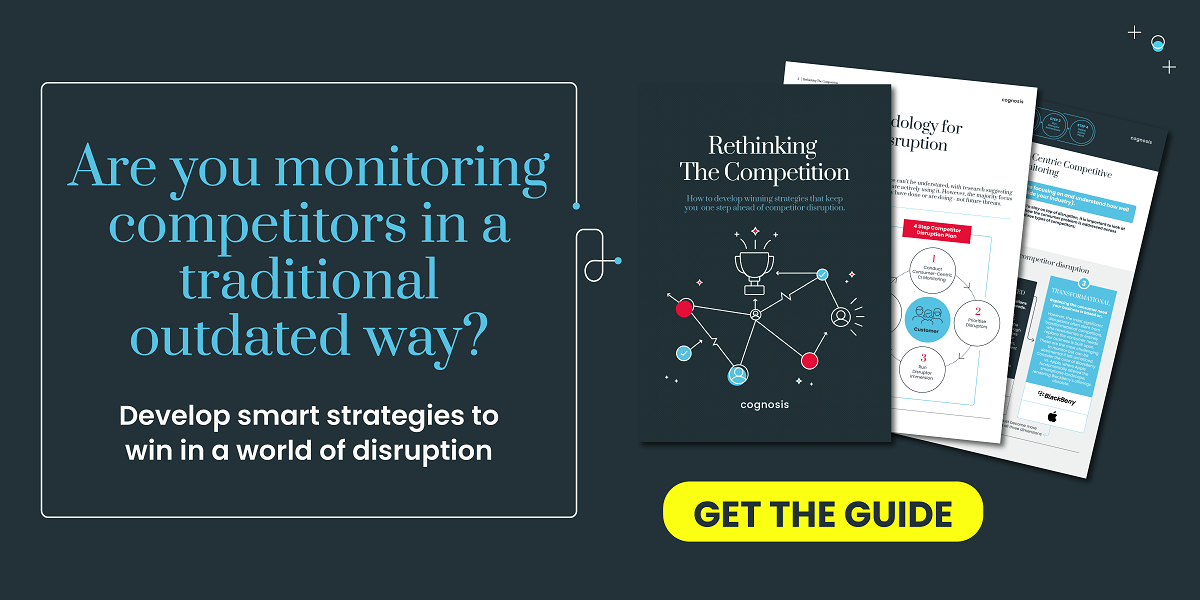Rethink your competition: Winning in a world of disruption
Are you monitoring your competition in a traditional outdated way? Catch up on the recording from our latest Cognosis Live panel discussion with Pia Kirkland and Duncan Campbell who posed this predicament to three industry professionals who have considerable experience at gathering competitive intelligence and how they're mitigating the new landscape of competitor disruption.
LOOK BEYOND YOUR DIRECT RIVALS
Competitor intelligence is used extensively worldwide. In fact, 82% of large enterprises already consider it to be a critical input within their business strategy. However, it’s also true that over 40% of global CEOs think that their companies won't survive the next 10 years due to disruption if they continue on their current path.
This high attrition rate asks the question: Is there a crucial blind spot in the way businesses are thinking about their competition?
Many companies obsess over their core competitors, at the expense of unexpected disruption from new rivals. Focusing on the customer problem can expose those transformational competitors, who present an existential risk by changing the consumer needs that your proposition is based on.
In our latest Cognosis Live online panel discussion, Pia Kirkland and Duncan Campbell posed this predicament to three industry professionals (see their profiles further down) who have considerable experience at gathering competitive intelligence to navigate disruption.
HIGHLIGHTS PACKAGE (YOU CAN SKIP TO THE REALLY GOOD BITS)
What do you think is the biggest disruptive threat to your business outside of your category? How can you monitor this threat?
Mark: New FinTech entrants are doing a really good job at simplifying the complex, and appealing to the next generation of investors and traders. They are shaking up the category in lots of different ways. Some of these competitors are growing at a rate much faster than what we've seen before. [3 mins]
How do you weigh up the role of brand leader with the need to stay ahead of new competitors? Can you be a leader and a challenger at the same time?
John: I think there's a balance between being first to market and signalling the way versus being quite choiceful in the trends you choose to capitalise upon or not. Also, product innovation can mean making existing formulations better rather than always investing in the shiny and new. [7mins]
Mark: Across our portfolio, we are category leader in certain markets and a challenger brand in others, where we have to take more risks and try more things. We then take those learnings back to the core business and apply them elsewhere. [10 mins]
Vero: In 2020, we launched BEES, our B2B digital platform on which two million small and medium-sized retailers in 24 countries can buy our products. This was very innovative and created a new concept for the market. It has helped to improve our relationship and service with retailers. Having a common definition of success allows us to replicate best practices in different markets, and give smaller business units the opportunities to match up to a local leader or competitor. [12 mins]
ABInBev has evolved into a much more consumer-centric company, but how do you think about the competition alongside the consumer?
Vero: Every consumer touchpoint is an opportunity to learn. From sales to marketing to operations, you need to leverage every one of those learnings and take them into actionable insights. You need to stay close to your consumers – the actual people that consume your products – but also keep an eye on the all the different consumer attachments that can bring you information around what is going on in the market. [18 mins]
Is there a shift from seeing the competition as a threat to a potential source of learning and opportunity?
John: If you want to be in business forever, there needs to be that humility of respecting your customer base, while staying confident in your own value propositions when faced with competitor threats. But sometimes something that initially seems bad can fundamentally inform a successful strategy over the next few years. [20 mins]
What role does AI play in monitoring and analysing competitor threats? Are there any watchouts?
Mark: When it comes to competitive intelligence and AI, it doesn't always work. It can give you wrong results and bad information. AI can destroy trust and damage your brand reputation. Therefore, we test it in conjunction with human beings to supplement our activities. In financial services, we need to think about GDPR and customer data too. In short, we’re taking AI seriously but using it carefully and cautiously. [24 mins]
What's the one piece of advice that you would give for using competitive intelligence in your strategic decisions?
John: Take time to step off the treadmill of day-to-day business, and really think about the competition. It may just reinforce your existing strategy, which is fine, but it may well be the thing that leads to some interesting new considerations and directions. [39 mins]
Mark: The key is staying ahead of competitors. Get the minimum viable product out there to see what works and what customers engage in. Test and refine, rather than taking years to build something perfect. [40 mins]
Vero: Be aware of what's going on. Go out there and talk with your consumers to see what competitors are doing. But then you have to come back and do the things that make sense for your own business and that could actually bring differentiation. [42 mins]
Pia's Top 3 key takeaways [43 mins]
- It’s not easy to balance the demands of being a category leader, while also entering new markets as a challenger. That takes a choiceful mindset, especially as missteps can damage trust built over many years.
- A consumer-centric approach to competitive intelligence relies on staying close to your consumers and learning from every single touch point.
- Leaders in the market often take a defensive mentality to an outside threat. But rather than shutting down to protect what you have, is there an opportunity to think differently – and to see disruption as a chance to learn and instigate something new?
MEET THE PANELISTS

- John Kourtoulos is Sales Director in the UK and Ireland for AkzoNobel, the global leader in paints and coatings. With more than 20 years’ commercial experience, John works in the decorative paint division and oversees renowned brands such as Dulux, Cuprinol, Hammerite and Polycell.
- Veronica Gomez Zalazar is Marketing Director at Anheuser-Busch InBev, the world’s largest beer producer. She spent the first 12 years of her career in her native Argentina, before moving to New York, where she leads the non-alcoholic beer category expansion.
- Mark Evans is Head of Corporate Development at IG Group, a leading provider of online investing and trading platforms and apps. IG has doubled in size since Mark arrived nine years ago, and now offers 90,000 markets across stocks, indices, commodities, bonds and crypto.
Defend and attack with competitive intelligence
Building a strategy for your own business is hard. Understanding that of your competitors is even harder. However, with bespoke competitor analysis, you can objectively appreciate your competition and identify what's required to stay one step ahead.
Competitive intelligence is also a source of business opportunity. By tapping into your rivals’ strategies, you can discover fresh insight to improve your own organisation’s strategic decision making. Recognising a potential threat early allows you to target partnerships and innovation that open new avenues for growth.
> RELATED ARTICLE: Competitor analysis tools for Strategy Development


